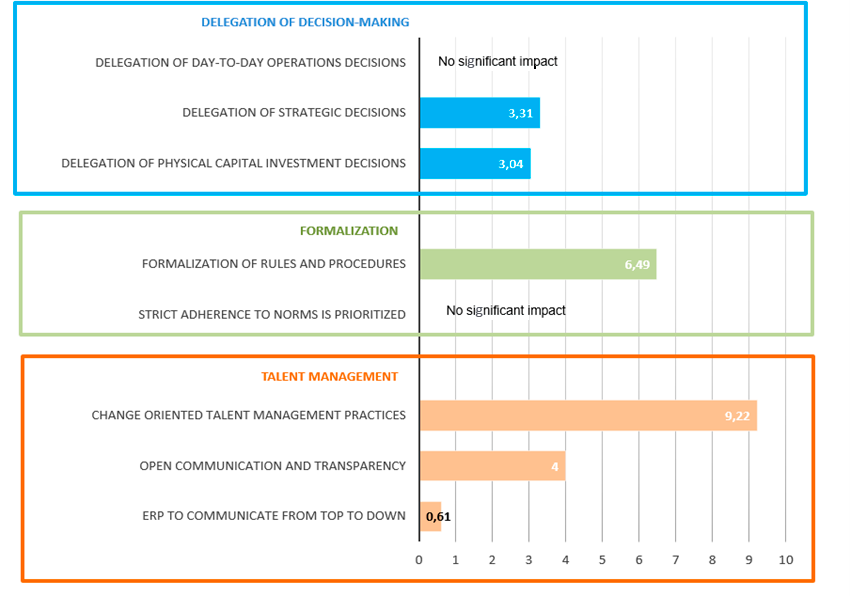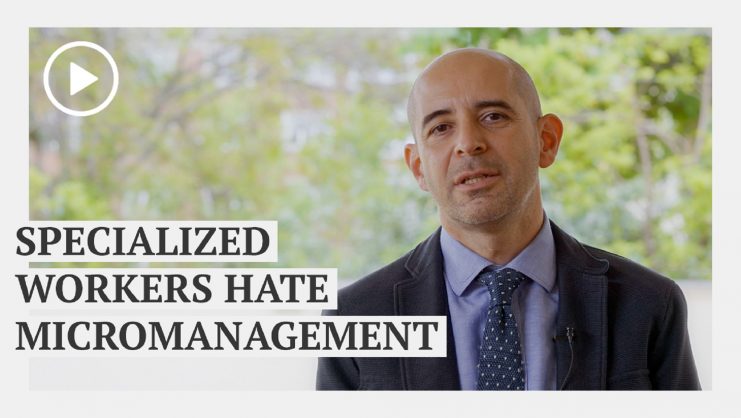As a human resource management professor at a business school, I often have managers confide in me that they want to leave their current position with a large company and work at a start-up. More often than not, these managers are looking for a place where they can employ their creativity. Unfortunately, they simply don’t feel they can innovate at their current company due to a lethal combination of slow decision-making coupled with excessive bureaucracy and too many rules.
Research has shown that entrepreneurially-minded managers are crucial to the introduction and promotion of innovation within a company, not only because of the roles they occupy but also because they are instrumental in getting their teams to commit to change. In other words, if a manager does not display entrepreneurial behavior, why would her subordinates do it?
We tend to associate entrepreneurial energy with a start-up’s early days and that company’s founders. But, it’s worth asking: can this spirit be kept alive over time? Can the professionalization necessary for a company’s growth be reconciled with a culture that is conducive to innovation and entrepreneurship?
To answer this, we studied the “entrepreneurial spirit” of several hundred managers working for large companies in Spain and collected exhaustive data about the practices and policies implemented in their employers. We defined the entrepreneurial spirit of managers as their ability and willingness to scan the environment, adapt to change and take initiatives autonomously in various situations, without requiring detailed instructions from higher-level managers, and thus contribute to the transformation of the company.
The analysis of the data, which has been presented in coordination with the IE Foundation and IE Center for Families in Business at IE University and with Coca-Cola European Partners (CCEP), demonstrates that, with the right policies in place, it is indeed possible to unleash the entrepreneurial spirit of managers in large organizations.
The entrepreneurial spirit as competitive advantage
In today’s environment, characterized by constant and unpredictable changes, the ability to adapt and rapidly transform is key for companies to maintain a competitive advantage. Not surprisingly, the term “agile organization,” which refers to companies that are capable of shortening innovation time, has recently acquired special relevance. The need to innovate in order to survive is top of mind for CEOs around the world. In a recent survey, 63% of CEOs expressed concern about improving innovation processes and implementation. In another survey, 55% of CEOs around the world expressed that the lack of key skills in company employees, including the ability to innovate, represented a significant barrier to growth.
Companies that allow their employees’ ideas to flourish possess a powerful weapon in the war for talent.
One of the key elements in achieving this innovation is to promote an intrapreneurship strategy, understood as the process through which company employees instigate renewal or innovation from within the organization. In addition, companies that allow their employees’ ideas to flourish possess a powerful weapon in the war for talent. In fact, a strategy based on intrapreneurship significantly reinforces the company’s brand image as an attractive employer, as supported by a recent report from the Great Place at Work.
Business practices: catalysts or inhibitors of entrepreneurship
It is the employees of the organization who are the ones that, in a voluntary and proactive way, introduce and promote innovation in the company and thus it is crucial that they have the skills to innovate. However, in addition to individual skills, it is necessary, and perhaps even more important, that employees have sufficient motivation to put these innovation skills into action. And this is where companies play a fundamental role, since the practices that they implement can promote or, on the contrary, restrict employee innovation-focused behavior.
Our study explores the relationship between the three main practices that are likely to change when organizations grow and professionalize and that can have an important influence on the entrepreneurial spirit of employees. The figure shows the importance of each factor in determining entrepreneurship spirit measured as the percentage of variance on entrepreneurship spirit explained by each factor.
Delegation of decision-making: Most relevant business decisions in a start-up are made as a team, but as a company grows many of these decisions become centralized in the upper management levels. In large firms, there is usually a hierarchical separation between decision-making and the execution of those decisions. A lack of decision making authority can negatively affect motivation and, particularly in those companies where decisions are made only at the highest hierarchical levels, middle managers may stop proactive entrepreneurship behaviors simply because they lead nowhere.
Managers need the freedom to make decisions in order to show an entrepreneurial spirit and they must have the power to move forward with initiatives that contribute to innovation and transformation within the company. This includes, for example, the ability to make strategic decisions about the introduction of new services or products, delimitation of the company’s strategy, and investment decisions in human and physical capital without prior authorization. Our study found that having authority over day-to-day work decisions (e.g., assigning tasks to their teams and establishing the work rhythm) does not really make a difference in a manager’s entrepreneurial spirit.
Formalization of procedures and rules: Almost inevitably, with growth comes formalization of processes within a company. This is often perceived as a barrier to introducing changes since it puts limits on the margins of action and for this reason, formalization is often received with suspicion by many employees in the company, especially by those who are accustomed to an informal environment. If such formalization is perceived as a limit to the autonomy of the employee, it can translate into less effort to show innovative behaviors, acting on them, and ultimately become a barrier to innovation in the company.
Entrepreneurial managers actually thrive when their framework is clear, so entrepreneurial activity does not diminish with the formality of a larger organization.
The freedom to take and act on decisions, however, does not necessarily equate with an absence of operational control and discipline. Our data reveals that entrepreneurial managers actually thrive when their framework is clear, so it is not that entrepreneurial activity diminishes with the formality that comes with a larger organization. In fact, well-defined guidelines on the authority structure, performance procedures, and rules and sanctions, for example, can actually favor a manager’s entrepreneurial spirit.
Talent management: As companies grow, policies for recruiting, training, and motivating talent inevitably become formalized and more established. The type of talent management policies that HR leaders adopt can thus have a tremendous impact on the behaviors enacted by employees and the organization at large. Our findings revealed that companies that have, on the one hand, hiring policies that prioritize the selection of candidates with high creative capacity, and, on the other hand, with evaluation, training and incentives to innovate, tend to have managers that show more entrepreneurial spirit.
Furthermore, the presence of a culture of open communication is another key element in talent management oriented towards innovation from within because it can foster an environment in which employees are able to make informed decisions about what needs to change. This type of culture can lead to innovation when open communication is not based solely on how well top management informs managers of the company’s situation, but also the degree to which managers feel they can communicate directly with top management.
We also found that enterprise resource planning (ERP) systems can help foster entrepreneurial behaviors when they are used to inform middle managers about top decisions. These ERP systems decentralize information and can serve as an important support tool for managers by encouraging an understanding of how the environment can affect the company and reveal possible improvements.
For all of these reasons, seasoned managers who have direct contact with senior management and who have fewer years of seniority in the company tend to be the individuals who present more innovative behaviors. (Interestingly, our study found that factors such as educational level or salary do not relate to entrepreneurial spirit.) Managers who are more satisfied with their current jobs also display more innovative behaviors in the organization, and women on average show more than men.
Our study made it possible to negate certain myths about innovating within a company. First, the data does not support the widely held belief that a high degree of formalization and strict compliance with standards acts as a barrier to innovation. On the contrary, such formalization can serve as a lever to foster the entrepreneurial spirit of managers in the company. In addition, we found no relationship between the size (within which the companies in the sample were all relatively large), the age of the company, or the number of hierarchical levels with the entrepreneurial spirit of the managers.
Large, established, and hierarchical companies can innovate from within, provided that the optimal conditions of decentralization, formalization, and change-oriented talent management are in place. Thus, in order to keep the entrepreneurial spirit alive, a company must nurture that spirit amongst employees and empower managers to make decisions. Innovation from within is possible, with just the right blend of freedom and formality.
© IE Insights.







